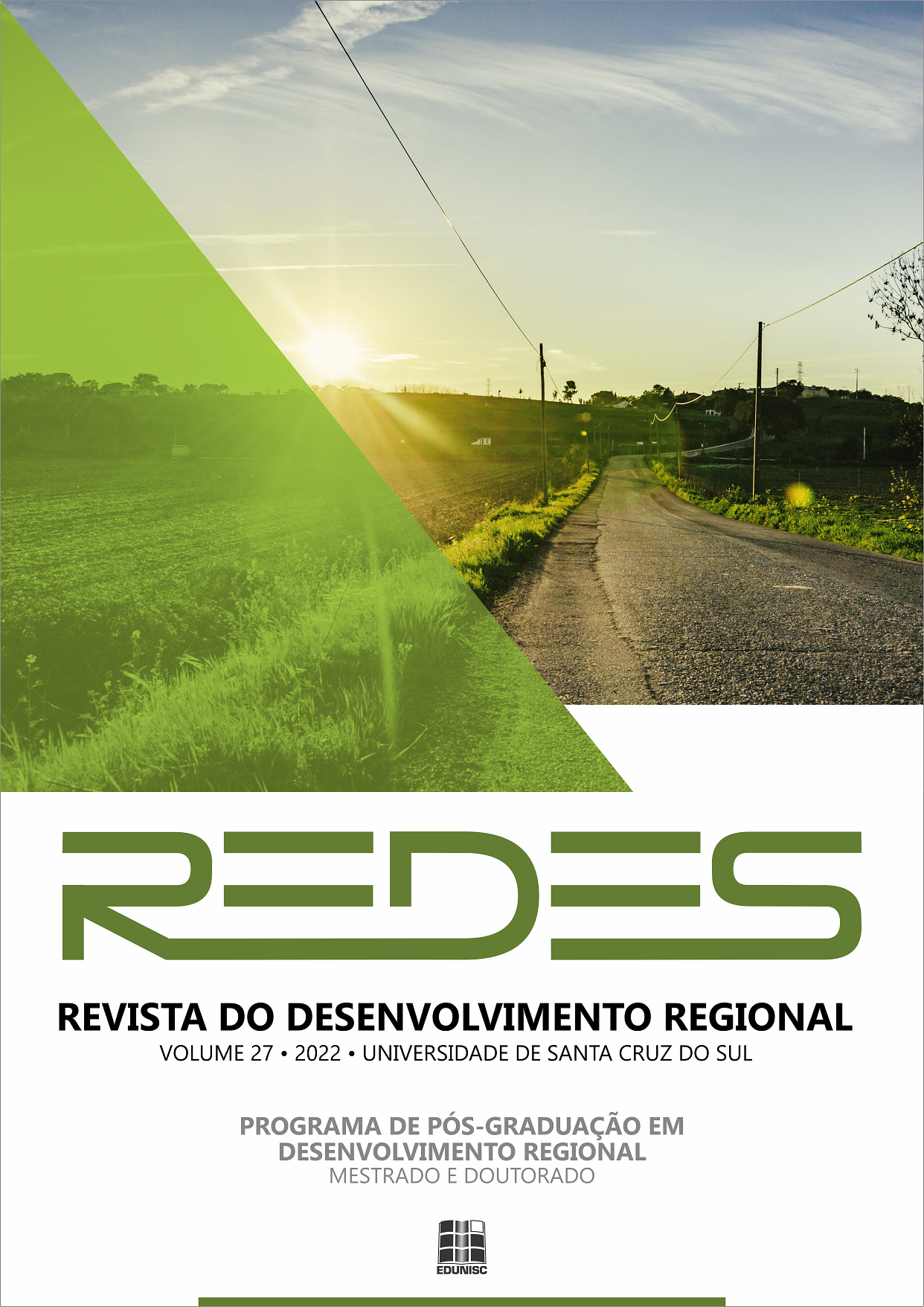Social Capital and Sustainable Development in the Region of Jalapão-TO
DOI:
https://doi.org/10.17058/redes.v27i1.17011Keywords:
Social capital, Sustainable development, Jalapão, Political ParticipationAbstract
Social capital refers to social attributes, such as trust, norms and systems, which contribute to the efficiency of society and mentioned by several researchers as one of the possible determinants of disparities in levels of development between regions, as well as a tool for achieving this. In this context, the objective of this research was to verify if the social capital, present in the region of Jalapão-TO, could be consider as one of the causes for the low level of development of the cities. Therefore, a qualitative study was conducted based on bibliographical research, documentary and semi-structured interviews with key actors in the region listed in the Ecological and Economic Zoning of the state of Tocantins. The results show that there is a weakness in social capital in the region, as trust between them has diminished in recent years, as well as their interest in participating in government management and projects, while they themselves are few organized to act collectively. However, the current state of social capital indicators in the region is the result of years of fruitless and poorly oriented projects, thus, it is still possible to include and integrate the subjects of the region, expanding their economic and social opportunities.
Downloads
References
BANDEIRA, Pedro S. (1999). Participação, articulação de atores sociais e desenvolvimento regional. Brasília, IPEA. Disponível em: <http://repositorio.ipea.gov.br/bitstream/11058/2758/1/td_0630.pdf>. Acesso em 13/04/2020.
BARDIN, Laurence. Análise de Conteúdo. São Paulo: Edições 70, 2016.
BOISIER, S. Política econômica, organização social e desenvolvimento regional. In: HADDAD, P. R. (Org.). Economia regional: teorias e métodos de análise. Fortaleza: BNB/ETENE,1989.
BOISIER, Sergio E. (1997). Sociedad civil, participacion, conocimiento y gestion territorial. Santiago de Chile, ILPES.
BOURDIEU, Pierre. O Capital Social: notas provisórias. In; NOGUEIRA, Maria Alice & CATANI, Afranio. Escritos de Educação. Petrópolis, 1998: Vozes.
BOWLES, Samuel., GINTIS, Herbert. Social capital and community governance. Economic Journal. Vol. 112. 2000.
BRASIL. Ministério da Cidadania. Secretaria Especial do Desenvolvimento Social. Cadastro Único – conhecer para incluir. 2021. Disponível em: < https://aplicacoes.mds.gov.br/sagirmps/bolsafamilia/index.html>. Acesso em 08 de fev de 2021.
COLEMAN, J. S. ‘Social Capital in the Creation of Human Capital’. The American Journal of Sociology. 94 (supplement), 1988, p. S95-S120.
CRESWELL, J. W. W. Projeto de pesquisa: métodos qualitativo, quantitativo e misto. 2. ed. Porto Alegre: Bookman, 2010.
DURSTON, John. Qué es el capital social comunitario? Santiago de Chile: CEPAL, 2000. (Serie Políticas Sociales, 38).
FUKUYAMA, F. Confiança: as virtudes sociais e a criação da prosperidade. Tradução de Alberto Lopes. Rio de Janeiro: Rocco. 1996.
GOULET, D. Desenvolvimento autêntico: fazendo-o sustentável. In: Cavalcante, C. Meio Ambiente, desenvolvimento sustentável e políticas públicas. São Paulo: Cor-tez ; Recife: Fundação Joaquim Nabuco, 1997.
GERHARDT TE, SILVEIRA DT. Métodos de pesquisa. Universidade Aberta do Brasil - UAB/UFRGS. Porto Alegre: Editora da UFRGS; 2009. A pesquisa científica; p.120. Available from: http://www.ufrgs.br/cursopgdr/downloadsSerie/derad005.pdf. Acesso em 20/03/2020
GROOTAERT, Christiaan et al. Questionário integrado para medir capital social (QI-MCS). Washington: Banco Mundial, 2003.
MOSCOVICI, F. Desenvolvimento Interpessoal. 10 ed. Rio de Janeiro: José Olympio, 2001. 276 ff.
NAZZARI, Rosana. Capital Social, Cultura e Socialização Política: a juventude brasileira. In: Capital Social: teoria e prática. BAQUERO, Marcelo e CREMONESE, Dejalma (Orgs). Ijuí: UNIJUÍ, 2006.
OLIVEIRA, Gilson B. de; LIMA, José E. de S. Elementos endógenos do desenvolvimento regional: considerações sobre o papel da sociedade local no processo de desenvolvimento sustentável. Rev. FAE, Curitiba, v. 6, n. 2, p. 29-37, maio/dez. 2003.
PUTNAM, Robert D. Comunidade e Democracia: A Experiência da Itália Moderna. 2ª ed. Rio de Janeiro. Editora FGV, 2000.
PUTNAM, Robert D. Jogando Boliche Sozinho: Colapso e Ressurgimento da Coletividade Americana. Tradutor – Marcelo Oliveira da Silva. 1 ed. Curitiba: Instituto Atuação, 2015.
ROUSSEAU, Denise M. SITKIN, Sim. BURT, Ronald S. CAMERER, Colin Farrell. Not so different at all: across-discipline view of trust. Academy of Management review, n. 23, p. 393-404, 1998. Disponivel em: < https://www.researchgate.net/publication/50313187_Not_So_Different_After_All_A_Cross-discipline_View_of_Trust>. Acesso em 01 de abril de 2021.
SACHS, Ignacy. Desenvolvimento: includente, sustentável, sustentado. Rio de Janeiro: Garamond, 2004.
SACHS, Ignacy. Caminhos para o desenvolvimento sustentável. Rio de Janeiro: Garamond, 2009.
SEN, Amartya. Desenvolvimento como Liberdade. 2. reimpr. São Paulo, Companhia das Letras, 2013.
SEPLAN. Zoneamento Ecológico-Econômico / Caracterização dos Atores Sociais, 2016 (b). Disponível em: <https://central3.to.gov.br/arquivo/443561/>. Acesso em 20/03/2020.



